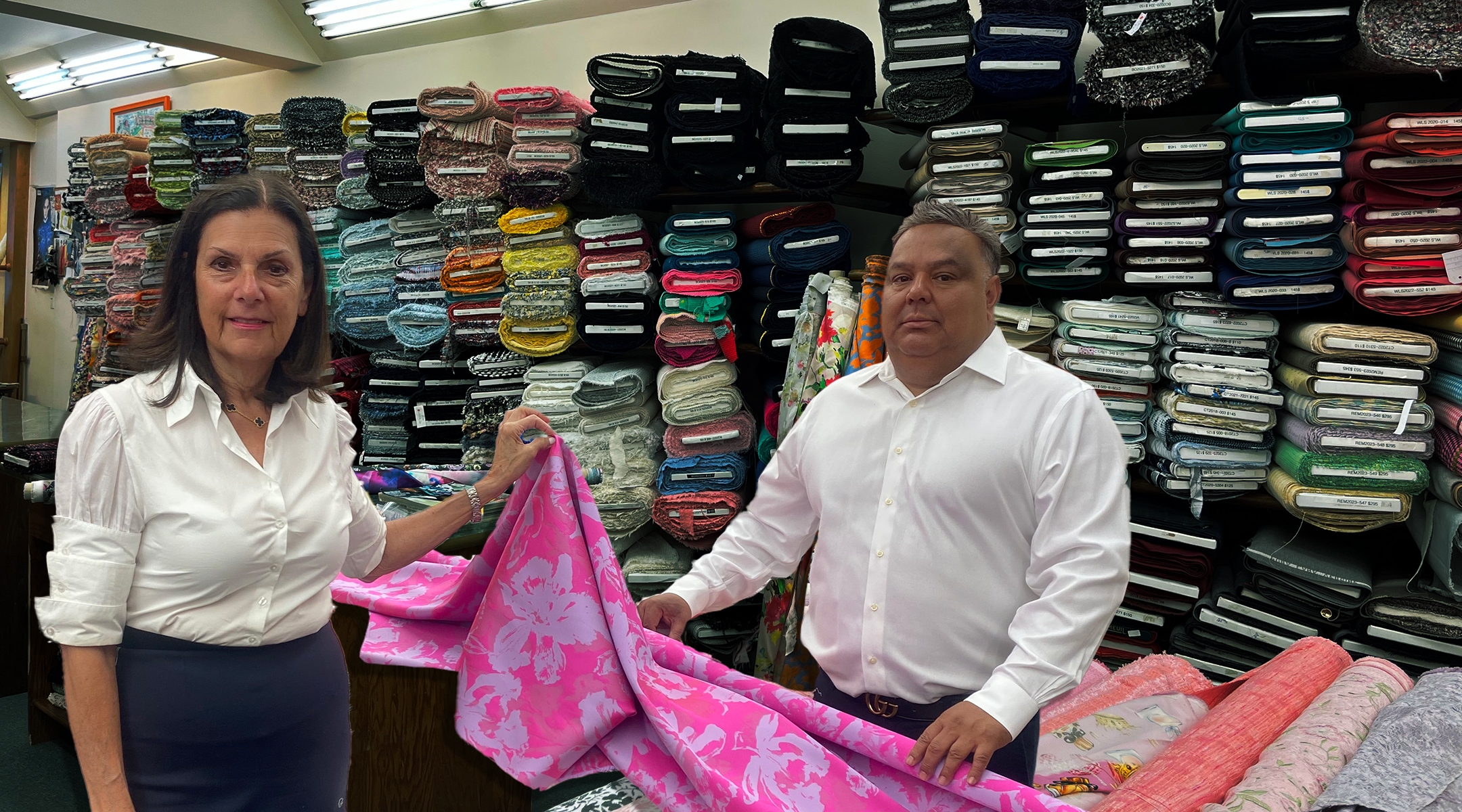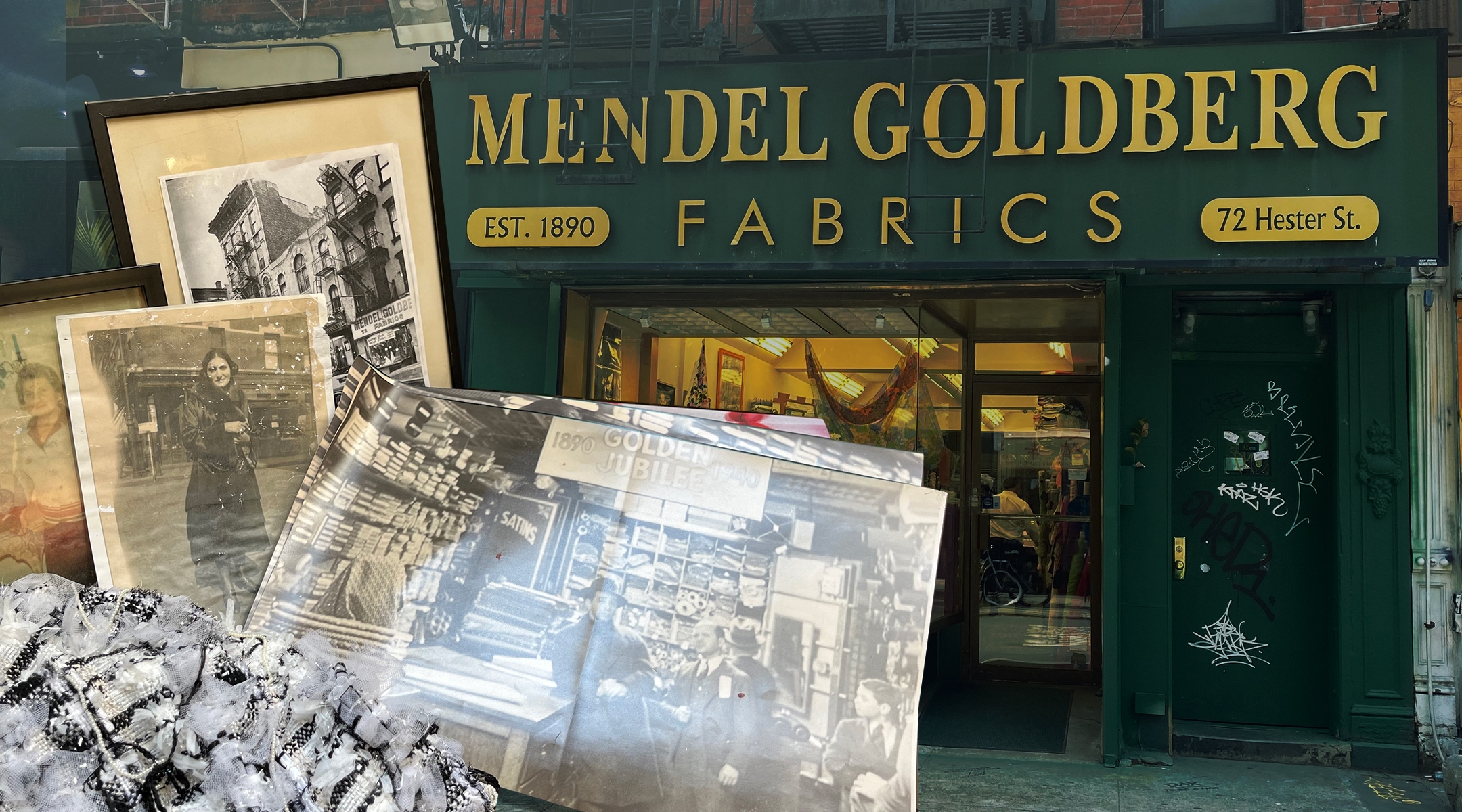(New York Jewish Week) — On Hester Street between Orchard and Allen, tucked away among trendy cafes, high-end clothing boutiques and a smattering of mom-and-pop shops, a green storefront with gold lettering that reads “Mendel Goldberg Fabrics” proudly boasts its year of establishment: 1890.
When Goldberg began his eponymous business more than 130 years ago, the Lower East Side was a neighborhood teeming with Jewish immigrants from Eastern Europe — Goldberg and his wife, Chana Henna, had themselves arrived in New York City from Poland in the late 19th century. Like so many other entrepreneurial immigrants, he sold thread from a pushcart. Eventually, the pushcart turned into a brick-and-mortar store at 72 Hester Street — where the business has remained ever since.
Today, the business is owned and operated by Alice Goldberg, Mendel’s great-granddaughter and the fourth-generation owner of Mendel Goldberg Fabrics. Over the decades, the shop has expanded its inventory from threads and tailoring supplies to silks and other high-end fabrics.
“The store is completely different now, because every generation did something different in this business,” said Alice Goldberg, who grew up watching her father at the store. “Mendel was selling thread from a pushcart. Alexander, his son, started selling silks and other tailoring supplies to the fur trade. My father, Samuel, was selling to Macy’s and Gimbels, who at that point had large fabric departments in New York, as well as starting to import from Europe.”
When Goldberg joined the business about 30 years ago, the store had already been around for a century. So, like her father and his father before him, she pivoted. “I went in the direction of the only thing I knew, which was high-end couture,” she said. “It was my background and all I was used to wearing. When I came in, the wall was a whole row of polyester fabric. It was selling very well; my father did very well with what he sold. But I needed to do what I knew, which was high-end designer.”
Goldberg sources most of her fabrics from Europe — Italy, Switzerland and France — which she purchases on yearly solo trips. These days, the store’s customers run the gamut from Broadway and television costume designers to the Metropolitan Museum of Art and anyone else in need of luxury fabric. Both the recent season of “The Marvelous Mrs. Maisel” and the upcoming season of Netflix’s “Bridgerton” feature dresses made from fabrics bought at Mendel Goldberg. Another high-profile client, Elaine Kaufman, the late proprietress of Elaine’s Restaurant on the Upper East Side, had 400 dresses custom made from fabrics bought at the store.
“The neighborhood is completely different,” Goldberg said, referring to the influx of boutiques, bars and cafes that have moved into the area since she started working there.
In 1890, the year Mendel Goldberg established his business, thousands of Jewish immigrants were arriving in New York from Eastern Europe. At the same time, the American garment industry was undergoing a rapid expansion, with New York City and the Lower East Side, in particular, emerging as a center. Many of these Jewish immigrants found jobs in the garment industry, in particular; according to the historian Howard Sachar, “By 1897 approximately 60 percent of the New York Jewish labor force was employed in the apparel field, and 75 percent of the workers in the industry were Jewish.”
Inside Mendel Goldberg Fabrics, the inventory may have changed, but the family’s integrity and dedication to the business remains the same. The walls of the store are covered in heaps of high-end, boutique colorful fabrics: silk, brocade, bouclé, wool, viscose, cotton, lace and linen. Family photographs from every generation are tacked up with pride.
Every weekday, Goldberg drives from her Upper East Side apartment to the store. There, she and manager Luis Ortega — who has been with Mendel Goldberg even longer than she has and is considered a member of the family — pull fabrics, cut orders and ship them out across the world, from California to Vietnam to New Zealand. They handle orders by phone and FaceTime, through an online system, as well as by appointment and from walk-in foot traffic in person. Goldberg’s daughter, Josepha, also works at the store and is likely to take over one day as the fifth-generation owner.

Alice Goldberg and the store’s manager Luis Ortega hold up fabrics inside the Lower Easy Side store, June 29, 2023. (Julia Gergely, design by Mollie Suss)
Goldberg pointed out that the store has always had a large Jewish clientele. “The Orthodox need fabric for shul, for yontif, for aufruf, for sheva brachot, for weddings, for bar and bat mitzvahs,” she said.
In fact, Goldberg’s first memorable sale was to a Hasidic mother who was buying fabric for her 16-year-old daughter. “I knew less than nothing,” Goldberg said, adding that she was able to find her a pink and green cotton fabric that would breathe and stay airy in the summer while still following community standards of tznius, or modesty.
After that, “I knew I had to shop for special fabrics for this clientele,” Goldberg, who is Modern Orthodox, said. With Hasidic and Orthodox men and women in mind, she sourced fabrics with a more conservative style — navys, blacks and whites, with elegant floral prints. To this day, many of Goldberg’s sales are in Hasidic Williamsburg, she said.
What’s more, the business is infused with Jewish values: “My father taught me to follow the Jewish laws of business,” Goldberg said. “It’s critical; the laws of the weights and measures; always pay your help and your suppliers before you take any money; close Shabbat and yom tov [holidays].”
Every fabric is also checked for shatnez — meaning that if it contains both linen and wool, it is prohibited by Jewish law. “If you follow the laws, you’re gonna do OK,” she said. “That’s what he [my father] taught me.”
“The truth is, the fact that I can carry this on and be a fourth-generation owner and keep the legacy alive for my family means everything to me,” she said. “My father left me the responsibility with confidence. So I’ve never let him down.”
To that end, Goldberg is a constant presence at the store. “When she wants to take a vacation, she only lasts three days,” Ortega said.
“I’m not a vacation gal,” responded Goldberg unabashedly.
In 2012, the store suffered from a devastating electrical fire. Despite the damage, Goldberg insisted she had to stay open: She rented a temporary location on Broome Street and set off for Europe to replace her damaged inventory, with the assistance of her younger daughter, Alexandra, while Josepha helped run the temporary location. “They worked like dogs, selling from boxes because we didn’t have enough shelves,” Goldberg said, marveling at her daughters’ dedication and their teamwork. A year later, they were back in the original building.
For Goldberg, living up to the legacy of her great-grandparents Mendel and Chana Henna; her grandparents, Alexander and Ida; and her parents, Samuel and Illean, is what keeps her going.
“This business survived because of the family. Mendel and Chana were immigrants. Every generation just ran with it and did well with it,” said Goldberg, tears welling in her eyes. “We’re going to continue. Family is the essence of this business.”
The New York Jewish Week brings you the stories behind the headlines, keeping you connected to Jewish life in New York. Help sustain the reporting you trust by donating today.





